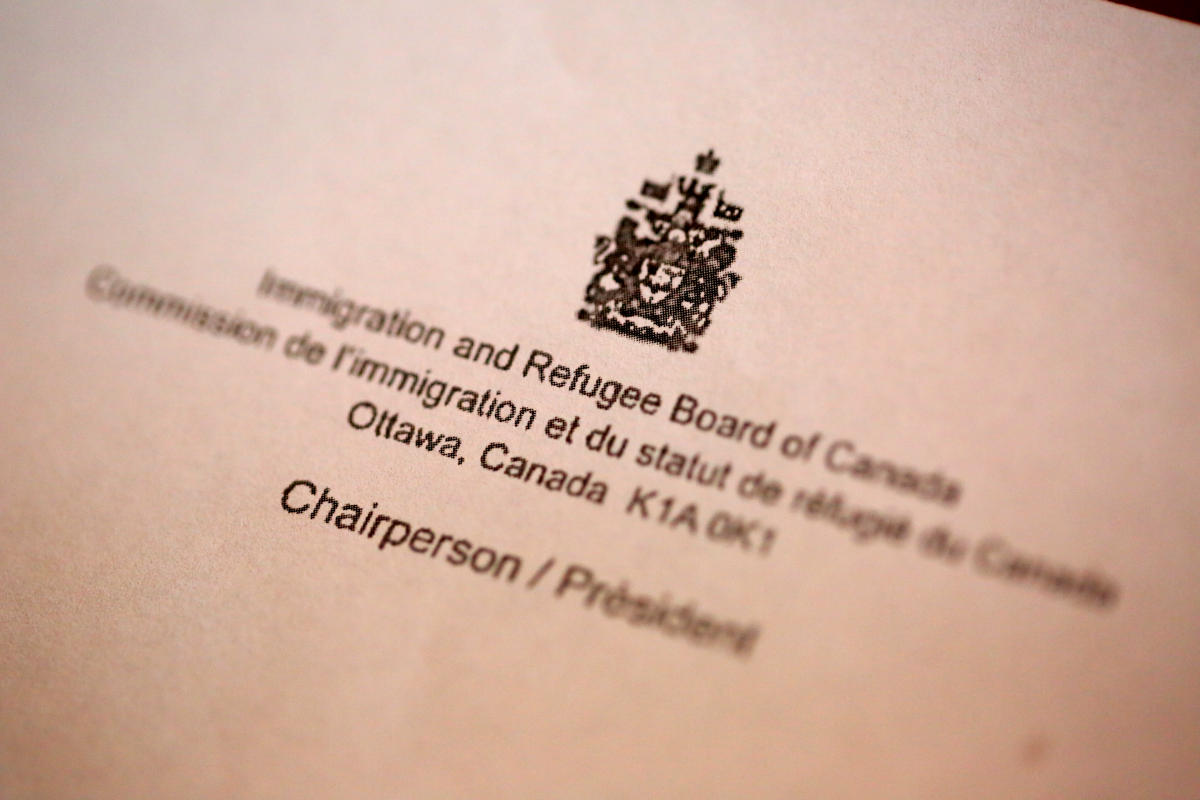Sexual assault and gender-based violence experts say they are deeply disturbed by the recent decision of a Canadian refugee adjudicator who said it “does not make sense” that a woman would keep a child conceived by rape.

The adjudicator also said she would have expected the woman to report the rape to medical professionals and her family “if, indeed, it took place.”
“(I am) sensitive to the subject of rape, but the claimant’s explanation does not make sense as to why she would keep a child who would remind her of being raped, unless that is not the case,” wrote Immigration and Refugee Board (IRB) adjudicator Sarwanjit Randhawa in her April 2019 decision.
During a hearing held roughly two weeks earlier, Randhawa asked the claimant if she considered having an abortion when she found out she was pregnant.
The woman said, no, it was her first child and she is against abortion. She also said she knows what it’s like to grow up without parents and that it isn’t the baby’s fault how she was conceived.
Still, Randhawa asked the woman why she chose to keep her baby.
“If you’re raped, why would you keep a child of rape?” she asked.
The Federal Court overturned Randhawa’s decision when government lawyers conceded she deprived the woman of her right to procedural fairness and natural justice.

Nneka MacGregor, executive director of Womenatthecentre, an organization that works to end gender-based violence, says she is appalled by Randhawa’s apparent lack of understanding about sexual assault, abortion access, and a woman’s right to choose.
MacGregor is calling on the IRB to take immediate steps to stop adjudicators from re-victimizing vulnerable claimants.
“It’s offensive,” MacGregor said. “It’s not anomalous, it’s not one rogue judge. It’s on the regular, it’s enough that people should be concerned.”
‘Horrified but not surprised’
- Train goes up in flames while rolling through London, Ont. Here’s what we know
- Budget 2024 failed to spark ‘political reboot’ for Liberals, polling suggests
- Wrong remains sent to ‘exhausted’ Canadian family after death on Cuba vacation
- Peel police chief met Sri Lankan officer a court says ‘participated’ in torture
Global News has previously reported on the IRB’s mishandling of sexual assault and gender-based cases, as well as claims that the board does not do enough to discipline refugee judges when they get things wrong.
In December, IRB appeals judge Jennifer Pollock ruled that a different refugee judge breached procedural fairness and violated the board’s gender guidelines by repeatedly asking a woman fleeing domestic abuse why her husband didn’t “just kill” her. The board has also launched an internal review of the case.
A 2018 investigation revealed allegations of “sexist” and “aggressive” behaviour by two former refugee judges, including one who demanded to see colour nude photos of a sex trafficking victim.
In response to these reports, the board said it takes allegations of wrongdoing seriously and that it investigates concerns in accordance with “fairness and due process.”

The IRB has, however, said there should be “no doubt” about the competence and professionalism of its members.
But Kaitlin Bardswich, communications and development manager at Women’s Shelters Canada, an organization that conducts research and supports women’s shelters through advocacy, says she has significant doubts about the competence of some refugee judges.
“Horrified but not surprised,” she said, referring to Randhawa’s conduct.
Bardswich says Randhawa’s decision suggests she is ignorant of the lived experiences of sexual assault survivors, many of whom choose to keep children conceived by rape.
According to a 1996 study published in the American Journal of Obstetrics & Gynecology, roughly 34,000 American women become pregnant each year after being sexually assaulted. The study showed that, on average, 32 per cent of survivors choose to keep their children, while half choose to have an abortion.
And even in the most extreme circumstances, such as the 1994 Rwandan genocide where roughly 20,000 children were conceived by rape, many victims chose to keep their children.

For a refugee judge to say a woman’s explanation for keeping a baby does not make sense is “horrifying,” Bardswich said.
“If that can happen in a genocidal situation, it can happen anywhere,” she said.
Bardswich is calling on the IRB to stop decision-makers from casting doubt on women because of how they act after being sexually assaulted. And if the board is unable or unwilling to do it, she says the government should step in.
“It’s the government’s responsibility,” she said. “They purport to be a feminist government … I think they need to put that into action.”
“Questioning women about how or why they did something after being raped, that’s not something we should be doing.”
Judges rely on ‘myths,’ stereotypes
Gillian Hnatiw, a lawyer who specializes in sexual assault law and chairs the Women’s Legal Education and Action Fund, says Randhawa’s questions and ruling are “saturated with disbelief and skepticism.”
She also says the board must stop refugee judges relying upon myths and stereotypes, such as expecting sexual assault survivors to report their attacks to police, medical professionals or family members.
Other myths include thinking women commonly lie about being sexually assaulted, expecting women should leave their abusers sooner, or believing that what a woman wears can lead to her being raped, Hnatiw said.
Refugee judges also routinely focus on inconsistencies in claimants’ stories as a way of challenging their credibility. But in cases involving sexual assault or domestic abuse, the board’s guidelines say adjudicators must consider how trauma affects a woman’s ability to recount past events, specifically saying women may have trouble remembering certain details.

In this case, Randhawa questioned the claimant about alleged “differences” in her account of being attacked. At first, according to the documents, the woman said she was gang-raped. Later, when speaking to a psychiatrist, she said she was assaulted by two men.
But the alleged differences aren’t actually differences, Hnatiw said, because there’s no legal definition of the term “gang rape” in Canada.
“It’s sadly not an uncommon thing for decision-makers in our society to allow rape myths to creep into their decisions,” she said.
“But these decisions from the IRB are, I would say, almost on a different level of disconnect from the law.”
Concerns require ‘immediate attention’
After declining to answer nearly two dozen questions about this story, IRB Chairperson Richard Wex sent a letter to refugee advocates across Canada saying the board is introducing new measures to make sure decision-making is done “efficiently, fairly, and in accordance with the law.”
This includes enhanced monitoring of refugee judges to “promote quality assurance” with how they conduct themselves during hearings, and annual, third-party reviews of the board’s refugee protection division.
Wex also said he believes the cases reported by Global News are “by no means systemic or representative in nature.” Still, he said they are concerning and that they “point to an area requiring immediate attention.”

In response to these reports, the board is imposing mandatory “refresher training” for all refugee judges, Wex said. The IRB also plans to set up a team of judges with specialized training to decide gender-based claims and to update its gender guidelines for the first time since 1996.
Wex’s letter also referenced concerns about the board’s ability to hold refugee judges accountable for their bad behaviour. He stopped short of admitting any specific problems with how the IRB disciplines judges, but said he is “personally committed” to making any changes necessary to strengthen the existing process.

But lawyers, such as Raoul Boulakia, say there’s no fixing the existing system, and that the board must implement an independent panel with the power to investigate refugee judges.
Boulakia also says training is only as good as what judges are willing to absorb.
MacGregor, meanwhile, says the board needs to rethink the way it approaches concerns over the mishandling of gender-based cases.
While she doesn’t dispute Wex’s claim that the vast majority of decision-makers do their jobs well — none of the experts Global News spoke with dispute this claim — she says the board must accept that in some cases, there are adjudicators whose behaviour and decisions show they act with little to no regard for the rules.
Global News asked the IRB if anyone from the board talked with or disciplined Randhawa after her decision was reversed. The board did not answer this question, adding that it is now reviewing the matter and that it would be inappropriate to comment further.










Comments